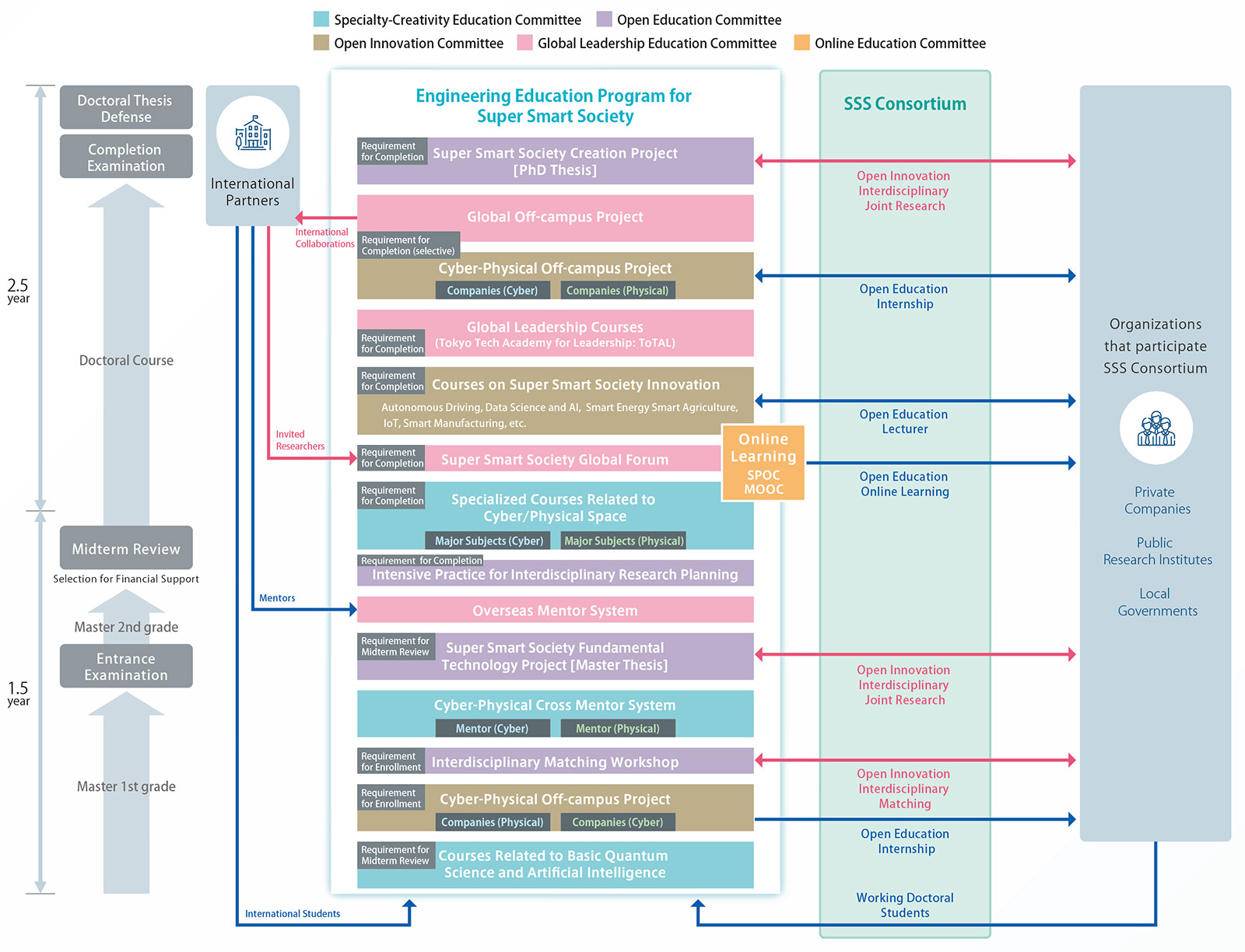
Cultivation of Specialized Academic Abilities & Creativities
1)Courses related to basic artificial intelligence and quantum science
To acquire the core academic skills necessary for the research and development of advanced technologies in a super smart society, this program carefully selects subjects related to artificial intelligence and quantum science. After demonstrating core academic abilities by passing a mid-term examination, students can enroll in education and research utilizing artificial intelligence and quantum science.
(Please refer to Tables 2-1 and 2-2 in the Study Guide)
Courses related to basic artificial intelligence (examples)
CSC.T272 Artificial Intelligence (Japanese)
XCO.T489 Fundamentals of artificial intelligence (English)
ART.T454 Advanced Topics in Artificial Intelligence S (English)
SCE.I501 Image recognition (English)
ART.T551 Image and Video Recognition (English)
ICT.H517 Advanced Measurement of Sensory Information (English)
Courses related to basic quantum science (examples)
EEE.D201 Quantum Mechanics (Japanese)
SSS.B401 Introduction to Quantum Science and Technology (English)
2)Specialized courses related to cyber/physical space
Students must earn credits in selected subjects related to cyber space and physical space to acquire “specialized academic ability & originality” for a super smart society.
(Please refer to Tables 4-1 and 4-2 in the Study Guide)
Specialized courses related to cyberspace (examples)
SCE.C453 Network Control Systems (English)
ART.T548 Advanced Artificial Intelligence (English)
ESD.C503 Design Theories (English)
Specialized courses related to physical space (examples)
MEC.G531 Precision Manufacturing Processes (English)
EEE.S451 Wireless Communication Engineering (English)
LST.A501 Biomolecular Analysis (English)
3)Cyber/physical cross mentor system
To objectively assess the significance from different viewpoints and to develop multi-faceted problem-solving skills, each student is assigned mentors who specializes in different fields. In addition, by providing consistent guidance in an integrated manner from master to doctoral course, students have improved outcomes that cannot be obtained with short-term experiences such as a lab rotation.
Cultivation of broad perspectives through social cooperation comprehensiveness
1)Courses on Super Smart Society Innovation
To cultivate professional skills and a holistic view, the courses are offered such that students can learn about real-world issues and advanced technologies toward a super smart society. The curriculum is developed in cooperation with the Super Smart Society Promotion Consortium’s participating organizations (national research institutes, private companies, municipalities, etc.). Students must earn credits from this group of subjects.
(Please refer to Table 5 in the Study Guide)
2)Cyber-physical off-campus project
Students must complete an internship at a participating organization of the Super Smart Society Promotion Consortium. The purpose is to develop human resources who can lead a super smart society by experiencing off-campus projects in fields different from their specialty.
(Please refer to Tables 1 and 6-1 in Study Guide)
Cultivation of problem-solving ability for interdisciplinary issues
1)Interdisciplinary matching workshop
Students participating in the program (including those considering participation), faculty members, and participating organizations in the Super Smart Society Consortium jointly attend a twice-yearly interdisciplinary workshop that aims to match students’ research achievements (seeds) and social research issues (needs). The program not only motivates students to contribute to society but also provides opportunities to build industry–academia joint research. Participation in this workshop is a prerequisite to enroll in the program. For more information, please refer to the SSS Promotion Consortium website
2)Intensive practice for interdisciplinary research planning
Intensive exercises on interdisciplinary and important issues selected by faculty and collaborating institutions are held to strengthen the research matching capability and to formulate a concrete research plan. These are held over the summer.
Clichk here for the practice record.
3)Super smart society basic technology research project
To cultivate problem-solving skills that encompass interdisciplinary fields, this project supports basic technology research to realize a super smart society under the mentorship of not only the students’ academic supervisors but also industrial and government advisors. A budget of 500,000 yen per year is allocated to support student-led research.
4)Super smart society innovation research project
For matched student/mentor research themes, students solve interdisciplinary social challenges by jointly conducting social implementation research projects toward innovating a super smart society with partner organizations. If an interdisciplinary research team is established, a research fund of up to two million yen per year will be allocated.
Cultivation of global leadership development
1)Global leadership courses
To cultivate the power to drive a super smart society, students must complete the University’s leadership education subjects and demonstrate leadership skills as part of a super smart society innovation research project and a global off-campus research project.
(Please refer to Tables 7-1 and 7-2 in the Study Guide)
2)Super Smart Society Global Forum
Students present research results and evaluate and determine research directions via discussions at the Super Smart Society Global Forum. This forum is organized by Tokyo Tech Academy for Super Smart Society, and leading researchers from around the world, including on overseas advisors, are invited.
3)Global off-campus project
Students intern at a research organization of an overseas partner or consortium-participating organization for three months or more, and conduct global joint research related to the student’s research theme. This activity fosters global leadership and deepens research contents. A maximum of 800,000 yen per student is provided for travel expenses.
(Please refer to Tables 6-2 in the Study Guide)
4)Overseas mentor system
Students in the doctoral program have an opportunity to understand their strengths and weaknesses through interviews with overseas advisors. This also allows students to build their professional network and determine their career paths from a global perspective.